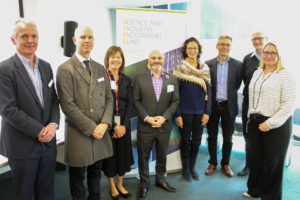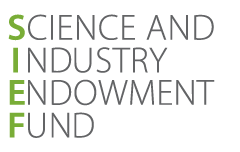December 2019 Newsletter

Dear SIEF supporter,
this is SIEF’s final newsletter for 2019. In looking back over the activities of SIEF in 2019, it has been another satisfying year in terms of SIEF’s contribution to the support of Australian science and industry.
I am particularly pleased to share news of further support from SIEF for early career researchers through the SIEF-AAS Fellowships to the Lindau Nobel Laureates meeting and Heidelberg Laureates Forum and the STEM+Business Fellowships. SIEF’s Promotion of Science program has, since 2010, supported one hundred and eighty students and early career researchers to develop their careers in STEM disciplines. With the extension of these programs, SIEF has demonstrated its continued commitment to supporting the next generation of scientists, mathematicians and engineers.
The SIEF office will take a well-earned break over the Christmas period, and will be closed from the 20 December and will reopen on the 6 January 2020. Best wishes for a restful festive period and I look forward to sharing further highlights from SIEF in 2020.
Dr Melissa Straffon
SIEF Manager
Melissa.Straffon@sief.org.au
(03) 9545 7952 or 0408 134 581
Renewed Funding for Early Career Researchers
SIEF-Australian Academy of Science Fellowships to the Lindau Nobel Laureates meeting and Heidelberg Laureate Forum.
In September, Dr Larry Marshall Trustee of SIEF announced an additional $1M of SIEF funding would be provided to continue the program until 2031, thus providing early career researchers the support to attend the annual Lindau meeting of Nobel Laureates and Heidelberg Laureate Forum. The Australian Academy of Science will continue to manage the competitive nomination process where each year up to ten of Australia’s best and brightest postgraduate students and postdoctoral fellows can be selected to attend the Lindau meeting, and one postgraduate student or postdoctoral fellow to attend the Heidelberg meeting.
Since the program’s inception in 2012, it has provided over sixty Australian early career researchers with a once in a lifetime opportunity to interact with Nobel Laureates, meet other early career researchers from across the globe, build networks, advance their careers and participate in the post Lindau Meeting SIEF Innovation Tour.
The call for applications for the 2021 Lindau Nobel Laureates meeting will open in August 2020. The call for applications for the Heidelberg Laureate Forum will open early in 2020. The Lindau Nobel Laureates Meetings are held annually in June/July and the Heidelberg Laureate Forum is held in September.
For more information visit the AAS website.
SIEF Ross Metcalf STEM+Business Fellowships

CSIRO SME Connect, SIEF and members of the Metcalf Family at the launch of the SIEF Ross Metcalf STEM+Business Fellowships in Melbourne November 2019.
In March SIEF was the recipient of a significant bequest from the late Mr Ross Metcalf, industrial chemist and inventor from Western Australia. The Trustee determined that Mr Metcalf’s generous bequest would create the greatest impact through the STEM+Business Fellowship Program, funding an additional eight to ten fellowships. The program is facilitated by CSIRO and links SME’s with early career researchers and research organisations through a postdoctoral fellowship. The additional fellowships will be called the SIEF Ross Metcalf STEM+Business Fellowships in recognition of the contribution to SIEF made by Mr Metcalf.
The official launch took place in November 2019 at the Melbourne SIEF STEM+Business day, which brings together the Fellows, their research organisation supervisors and the SME for a day of networking and peer learning. Members of Mr Metcalf’s family travelled from WA to attend the launch, learning first hand of the innovative projects currently funded.
Applications are currently open for the new Fellowships.
For more information visit CSIRO.au
Experimental Development Program
The SIEF Experimental Development Program funds projects to progress technology development to a stage suitable for attracting commercial investment and market uptake. The Trustee recently approved funding for a new project to upscale graphene membranes for water purification. The membrane is anti-fouling, anti-scaling, long-lasting, and has been shown to remove contaminants including mineral oils, acids and PFAS chemicals. Its advantage over conventional systems is it purifies water using less steps. The funding will be used to develop a demonstration device able to produce commercially significant volumes of purified water at a reduced cost compared with existing technologies. The project will commence in 2020.
Information about GraphAir can be found on the SIEF website.
